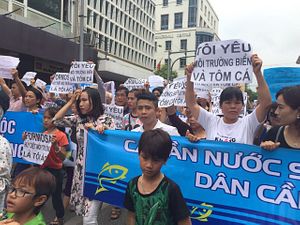The Formosa scandal in Vietnam has recently made international headlines and offered the international community a rare glimpse into the fringe, but steadily growing, culture of protest and activism in the authoritarian state. The ecological catastrophe, which saw millions of fish die in central Vietnam due to improper waste disposal by a Taiwanese-owned steel factory, triggered demonstrations around the country — an unusual occurrence in Vietnam.
The Formosa affair caused the latest and largest ecologically-driven protest wave to hit the country, but over the course of the past few years, citizens have increasingly mobilized to voice their grievances on a range of issues.
The ecological cause has been particularly prominent. In late 2015 citizens in Hanoi rallied to prevent the city council from chopping down an estimated 6,700 trees. Eventually, local authorities did drop the project. In 2009, residents of the Central Highlands region also repeatedly, but unsuccessfully, opposed Chinese-backed bauxite mining projects.
Stark socio-economic inequalities and aspirations for fairer living conditions have also come to the forefront. In mid-2015, a staggering 17,000 employees working for footwear manufacturer Pou Chen Group went on a three-day strike in a plant in Dong Nai Province, southern Vietnam, to resist the implementation of new benefits regulation.
Likewise, the previously latent frustration with the ho khau system has progressively become more vocal. This permit of residence, in effect an institutionalized form of urban apartheid, limits internal relocation and has created an estimated 5.6 million second-class citizens who have limited access to public schools or pay more for government-subsidized electricity and water.
Evidently the absence of democratic institutions and humans rights concerns are central problems for many citizens. There are numerous examples of political dissidents and bloggers who have taken it upon themselves to defy the state and inform the international community of this darker aspect of life in Vietnam.
In March, the trial of prominent Vietnamese blogger Nguyen Huu Vinh, better known as Anh Ba Sam, triggered protests in the city of Hanoi and during President Barack Obama’s trip to the country in May 2016 a number of activists managed to meet with the U.S. leader. Religious and ethnic communities too, such as the Montagnard Christians or the Hoa Hao Buddhists, regularly and publicly denounce the harassment they face at the hands of the communist regime. More surprisingly, a handful of independent candidates — including popular Vietnamese singer Mai Khoi — even ran for office, albeit unsuccessfully, in the latest controlled parliamentary elections.
These minor acts of civil disobedience bear testimony to the burgeoning spirit of defiance toward the Vietnamese elite and the way it rules the country. Vietnam’s population — young, web connected, and increasingly educated — is paying close attention to developments in the region and taking stock of the democratic desires of people in Myanmar and Hong-Kong.
The government is well-aware of this simmering exasperation. If it has seemingly tolerated circumscribed protests as a necessary trade-off to its newfound respectability among the international community, it will certainly not accept generalized dissent. Indeed, as soon the anti-Formosa movement seemed to be gaining too much traction and international attention for its taste, the government proved highly effective in quelling the protests.
The tools the state can rely on to quash dissent are not particularly original, but they are certainly time-tested. The secret police, the feared Ministry of Public Security, was trained by the Stasi and it is ubiquitous in Vietnam. Amnesty International’s latest report paints a terrifying picture of Vietnam’s prison system, with widespread torture and ill-treatment — enough to deter even the boldest of activists.
Press censorship, notably filtering texts containing sensitive terms or the temporary blocking of social media platforms such as Facebook, considerably hamper communication and organization for civil society while the state-controlled media continues to churn out the regime’s propaganda. Legal mechanisms and restrictions abound to ensure anything perceived as an anti-state activity is kept in check.
However if these displays of discontent continue to multiply and public anger goes on mounting, they will certainly pose a challenge for the government who will then have to decide on its course of action: repression or reform.
Arthur Beaufort is a post-graduate student at King’s College London, completing an MA in Geopolitics, Territory and Security. He has previously published on international relations issues for a number of publications including the Australian Institute for International Affairs and New Eastern Europe.

































